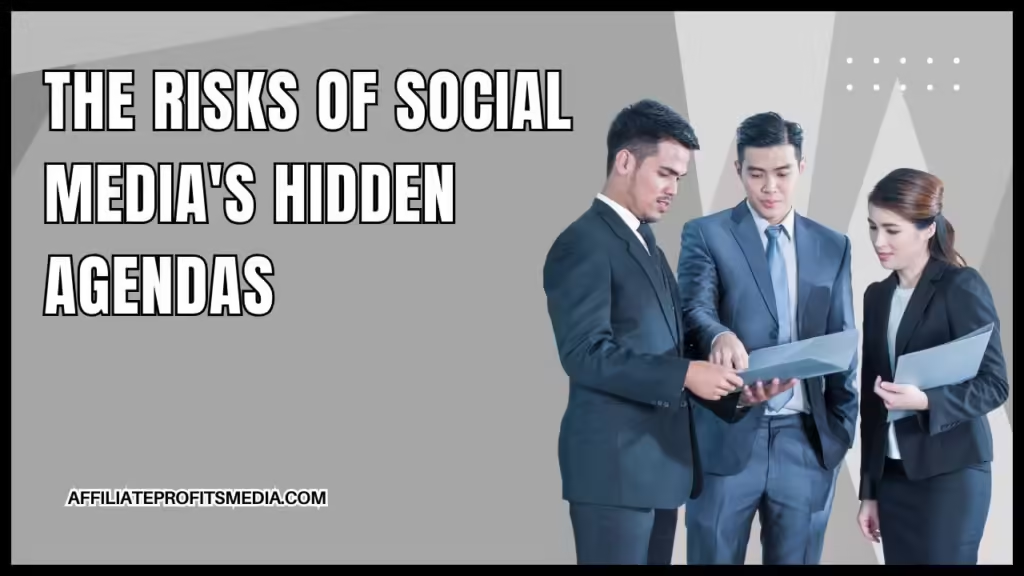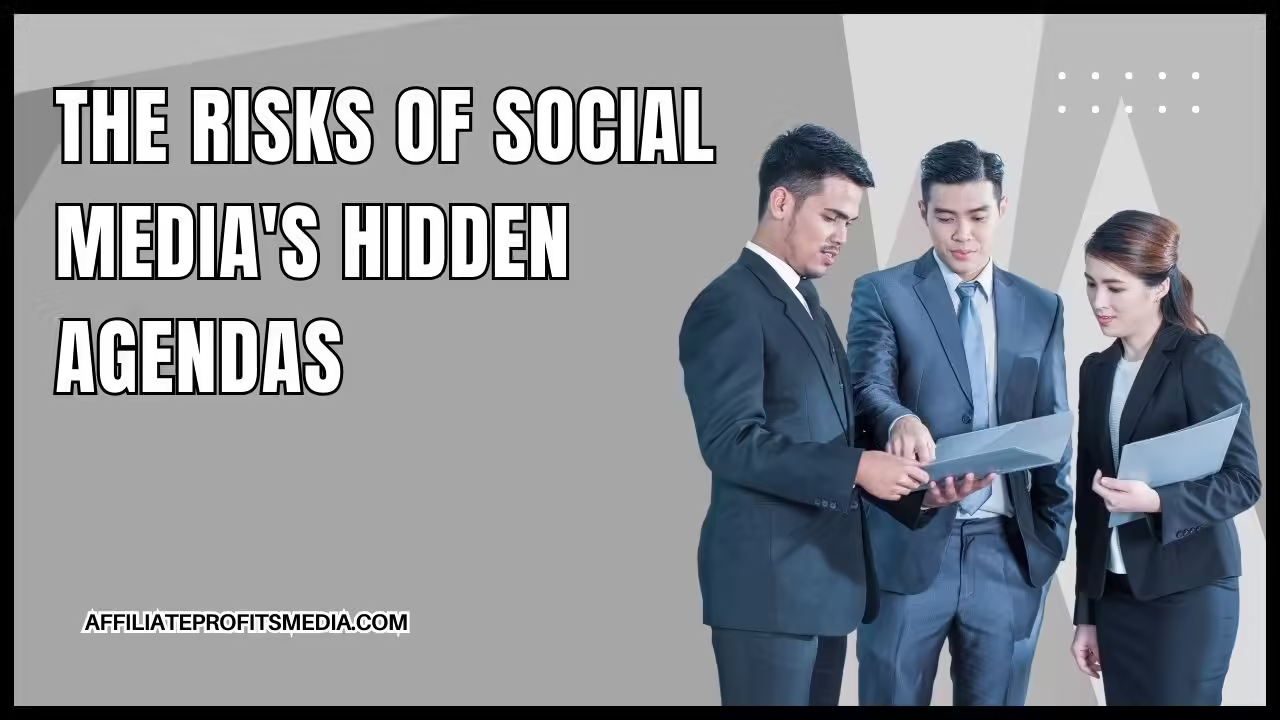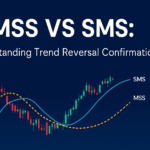Social media has revolutionized the way we connect, communicate, and share information. However, beneath its surface lies a complex web of hidden agendas that can pose significant risks to users and society at large. Understanding these risks is crucial in navigating the digital landscape safely.
>> Here’s the Proven Way to Make $100-$200 Daily with 0 Investment – Watch This FREE Video and Start Now >>

1. Manipulation of Public Opinion
Social media platforms often prioritize content that generates engagement, which can lead to the manipulation of public opinion. Algorithms amplify sensationalist or polarizing posts, shaping users’ perceptions and beliefs. This manipulation can create echo chambers where individuals only encounter viewpoints that reinforce their own, further dividing society and undermining democratic discourse.
2. Data Privacy Concerns (Social Media)
Many social media platforms collect vast amounts of personal data from users, often without their explicit consent. This data is used to create targeted advertisements and influence behavior. Data breaches and misuse can lead to identity theft, financial loss, and a general erosion of trust in digital platforms. Users must be aware of the information they share and the potential risks associated with data privacy.
3. Psychological Impact and Addiction
The design of social media platforms encourages addictive behaviors, leading to negative psychological effects such as anxiety, depression, and low self-esteem. Users often compare themselves to curated images of others’ lives, leading to feelings of inadequacy. The constant need for validation through likes and shares can create a detrimental cycle, impacting mental health and overall well-being.
4. Spread of Misinformation (Social Media)
Social media serves as a breeding ground for misinformation and fake news. The rapid spread of false information can have real-world consequences, including public health risks, political unrest, and societal division. Users may struggle to distinguish credible sources from unreliable ones, emphasizing the need for media literacy and critical thinking skills.
5. Influence of Algorithms on Content Exposure
The algorithms used by social media platforms dictate what content users see, often prioritizing engagement over accuracy or relevance. This can lead to a distorted view of reality, as users are bombarded with content that aligns with their preferences rather than exposing them to diverse perspectives. The lack of transparency regarding these algorithms exacerbates the issue, as users remain unaware of how their online experience is shaped.
6. Censorship and Freedom of Expression (Social Media)
While social media platforms can provide a space for free expression, they also wield the power to censor content deemed inappropriate or harmful. This can result in the suppression of legitimate voices, stifling healthy discourse and limiting the diversity of opinions. The ambiguity surrounding content moderation policies raises concerns about who decides what is acceptable and the potential for bias in enforcement.
>> Here’s the Proven Way to Make $100-$200 Daily with 0 Investment – Watch This FREE Video and Start Now >>
Manipulation of Public Opinion
The rise of social media has transformed communication, but it has also opened the door to the manipulation of public opinion. Understanding how this occurs is vital in today’s digital landscape.
1. Algorithmic Bias
Social media platforms use algorithms that prioritize content based on user engagement, often amplifying sensational or polarizing posts.
2. Echo Chambers
Users are frequently exposed to similar viewpoints, creating echo chambers that reinforce existing beliefs and limit exposure to diverse perspectives.
3. Targeted Advertising
Political and commercial entities leverage targeted advertising to influence users’ opinions based on their online behavior and preferences.
4. Fake News
The spread of misinformation can shape public perception, often leading to misguided beliefs or actions based on false narratives.
5. Influencer Endorsements
Influencers can sway public opinion through endorsements, promoting products or ideas to their followers without full disclosure.
6. Astroturfing
Coordinated campaigns can simulate grassroots support, misleading the public about the authenticity of certain viewpoints or movements.
7. Censorship
Content moderation can sometimes silence dissenting opinions, skewing public perception by limiting access to alternative viewpoints.
Being aware of these tactics is crucial for individuals to navigate social media critically and make informed decisions about the information they consume.
Data Privacy Concerns (Social Media)
Social media platforms have become integral to daily life, but they also pose significant data privacy concerns. Understanding these issues is essential for protecting personal information.
1. Data Collection
Social media sites collect vast amounts of personal data, including location, interests, and online behavior, often without explicit user consent.
2. Targeted Advertising
Collected data is used for targeted ads, influencing user behavior and preferences based on detailed personal profiles.
3. Data Breaches
Hackers may exploit vulnerabilities to access sensitive information, leading to identity theft and financial loss.
4. Third-Party Sharing
Personal data may be shared with third-party companies, raising concerns about how this information is used and protected.
5. Lack of Transparency
Platforms often lack transparency about data usage practices, leaving users unaware of how their information is handled.
6. Regulatory Challenges
Existing regulations may be insufficient to address evolving privacy concerns, making it difficult to ensure robust protection.
Awareness of these data privacy issues is crucial for users to safeguard their personal information and advocate for stronger privacy protections.
Psychological Impact and Addiction
Social media’s pervasive presence has significant psychological effects and potential for addiction. Recognizing these impacts is essential for maintaining mental well-being.
1. Constant Validation
Social media platforms often reward users with likes and comments, creating a cycle of seeking external validation that can impact self-esteem.
2. Comparative Behavior
Exposure to curated, idealized images of others’ lives can lead to unhealthy comparisons, increasing feelings of inadequacy and low self-worth.
3. FOMO (Fear of Missing Out)
The fear of missing out on social events or trending topics can drive excessive social media use, leading to anxiety and stress.
4. Screen Time Overload
Extended use can disrupt daily routines, including sleep patterns, and lead to sedentary behavior, impacting physical health.
5. Addictive Patterns
The design of social media encourages addictive behavior, with features like notifications and infinite scrolling making it hard to disconnect.
6. Mental Health Issues
Prolonged use has been linked to increased rates of anxiety, depression, and loneliness, especially among younger users.
7. Decreased Productivity
Excessive use can negatively affect productivity and focus, as users spend significant time on social media rather than engaging in productive activities.
Being aware of these psychological impacts and addictive tendencies helps users manage their social media habits and prioritize mental health.
Spread of Misinformation (Social Media)
Social media has amplified the spread of misinformation, affecting public perception and decision-making. Understanding how this occurs is crucial for discerning reliable information.
1. Viral Sensationalism
Misinformation often goes viral due to its sensational or emotionally charged nature, capturing attention and spreading rapidly.
2. Echo Chambers
Algorithms create echo chambers by showing users content that aligns with their beliefs, reinforcing misinformation without exposure to factual corrections.
3. Lack of Fact-Checking
Many platforms lack rigorous fact-checking mechanisms, allowing false information to proliferate unchecked and gain credibility.
4. Bots and Fake Accounts
Automated bots and fake accounts can amplify false narratives and create the illusion of widespread support or consensus.
5. Manipulative Content
Misinformation is often designed to manipulate opinions or behaviors, exploiting emotional triggers and cognitive biases.
6. Difficulty in Correction
Once misinformation spreads, correcting it can be challenging, as false claims often stick in public memory despite later retractions.
Awareness of how misinformation spreads helps users critically evaluate sources and promotes a more informed digital environment.
Influence of Algorithms on Content Exposure
Algorithms shape our social media experiences by determining what content we see. Understanding their influence is key to navigating digital platforms effectively.
1. Personalization
Algorithms analyze user behavior to deliver personalized content, prioritizing posts that match individual interests and past interactions.
2. Engagement Boost
Content that generates high engagement—likes, shares, comments—is favored, pushing it to the top of users’ feeds and increasing its visibility.
3. Echo Chambers
By showing content similar to what users have engaged with before, algorithms create echo chambers where users only see reinforcing viewpoints.
4. Content Filtering
Algorithms filter out content that doesn’t match user preferences or past behavior, limiting exposure to diverse perspectives and new ideas.
5. Trend Amplification
Trending topics and viral content are promoted by algorithms, often overshadowing less popular but potentially important issues.
6. Paid Promotion
Brands and individuals can use paid promotions to boost their content, often giving them more visibility than organic posts.
7. Algorithmic Bias
The design of algorithms can unintentionally perpetuate biases, skewing content exposure and reinforcing existing prejudices.
Recognizing the influence of algorithms helps users critically assess their social media feed and seek a broader range of information.
Censorship and Freedom of Expression (Social Media)
Social media platforms are pivotal in modern communication but face challenges regarding censorship and freedom of expression. Here’s how these issues play out.
1. Content Moderation
Platforms implement content moderation to enforce community guidelines, which can lead to the removal of posts deemed inappropriate or harmful.
2. Bias in Enforcement
Censorship decisions may reflect bias, with inconsistent application of rules that can disproportionately affect certain groups or viewpoints.
3. Suppression of Dissent
Censorship can suppress dissenting voices and critical opinions, limiting healthy debate and stifling democratic discourse.
4. Algorithmic Influence
Algorithms may prioritize content that aligns with platform policies, potentially censoring controversial yet important discussions.
5. Legal and Political Pressures
Governments and political entities may pressure platforms to censor content, impacting freedom of expression and leading to potential abuses.
6. False Reporting Abuse
Users can misuse reporting tools to censor content they disagree with, leading to unjust removal of posts and infringement on free speech.
7. Transparency Issues
Lack of transparency in censorship practices leaves users uncertain about why their content is moderated, impacting trust in the platform.
Understanding the balance between censorship and freedom of expression is crucial for users to navigate social media responsibly and advocate for fair practices.
Conclusion
As we continue to navigate the complexities of social media, it is essential to remain vigilant about its hidden agendas and the associated risks. By being aware of manipulation tactics, data privacy issues, psychological impacts, misinformation, algorithmic influence, and censorship, users can engage more responsibly and advocate for a healthier digital environment. Understanding these challenges empowers individuals to protect themselves and fosters a more informed online community.
>> Here’s the Proven Way to Make $100-$200 Daily with 0 Investment – Watch This FREE Video and Start Now >>
Thank you for taking the time to read my article “The Risks of Social Media’s Hidden Agendas”, hope it helps!













